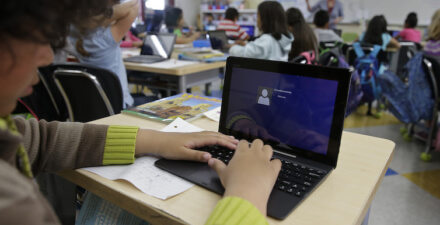Education has long been viewed as the “great equalizer,” yet educational opportunity in the United States varies dramatically depending a family’s income. Equitable Growth’s work on K-12 education includes work on the role of school finance in equalizing opportunity and outcomes, as well as the potential synergies between investments in early childhood and later investments in K-12 education.
Featured work
Police in public schools harm students, leading to far-reaching socioeconomic inequalities alongside less safe schools
April 19, 2023
April 19, 2023
How Black activists spurred the U.S. government to expand school meal programs, addressing child hunger and boosting future productivity
February 22, 2022
February 22, 2022
The economic benefits of equal opportunity in the United States by ending racial, ethnic, and gender disparities
June 29, 2021
June 29, 2021
U.S. school segregation in the 21st century
October 15, 2019
October 15, 2019
Inequality of educational opportunity? Schools as mediators of the intergenerational transmission of income
April 23, 2018
April 23, 2018
Closing the homework gap: Why accessibility to high-quality broadband matters to U.S. schoolchildren
September 28, 2018
September 28, 2018
Explore Content in K-1264
Request for Proposals: The economic effects of the Inflation Reduction Act
April 2, 2025
April 2, 2025
Request for Proposals: Promoting competition and supporting workers in an era of AI innovation
November 20, 2024
November 20, 2024
Request for proposals: Research grants for early career scholars
October 30, 2024
October 30, 2024
Request for proposals: Research grants for early career scholars
November 30, 2023
November 30, 2023
The economic costs of gun violence in the United States
July 18, 2023
July 18, 2023
Police in public schools harm students, leading to far-reaching socioeconomic inequalities alongside less safe schools
April 19, 2023
April 19, 2023
Expert Focus: Researchers advancing our understanding of U.S. child care policy and how to improve the early care and education system
October 27, 2022
October 27, 2022
How Black activists spurred the U.S. government to expand school meal programs, addressing child hunger and boosting future productivity
February 22, 2022
February 22, 2022
A cost-benefit analysis of The American Families Plan’s proposed investment in a nationwide public preschool program
September 22, 2021
September 22, 2021
The economic benefits of equal opportunity in the United States by ending racial, ethnic, and gender disparities
June 29, 2021
June 29, 2021
Public investments in education can spur equitable growth, pay for themselves, and create jobs for a stronger economic recovery
October 27, 2020
October 27, 2020
The coronavirus pandemic requires a wartime commitment for essential workers’ access to childcare
April 16, 2020
April 16, 2020
Explore the Equitable Growth network of experts around the country and get answers to today's most pressing questions!
















